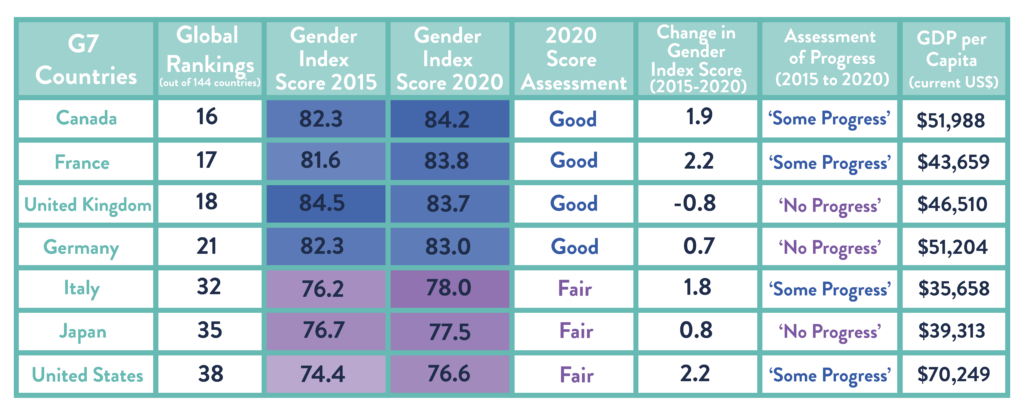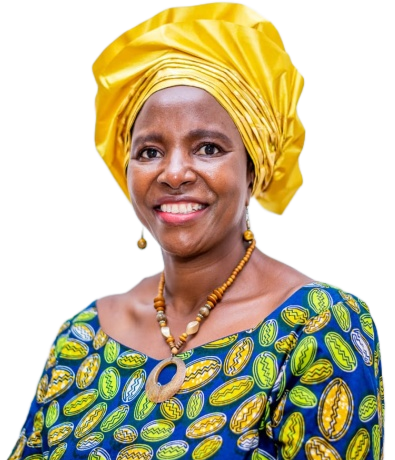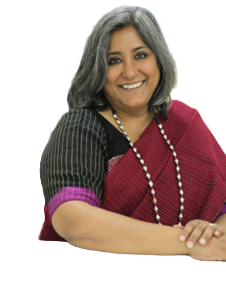W7 Takeover: What commitments would G7 Leaders make if gender equality advocates had their say?
G7 Leaders are about to meet in Hiroshima, Japan for the annual G7 Summit. As the EM2030 Index data shows, the G7 countries have much more to do to close gender gaps at home. In recent years, not one of the G7 countries made “fast progress” on gender equality, and three of them (the UK, Germany, and Japan) made “no progress” at all.

We know that gender equal countries are healthier, better educated and safer and also more peaceful. So surely the G7 countries will have gender equality, and how to accelerate progress for girls and women, at the top of the agenda for their Leaders Summit. Don’t count on it.
Where’s a G7 gender equality champion to turn? Thankfully, we have a group of assembled experts on gender equality – the Women 7 Advisors – who are ready with the (evidence-based) solutions that G7 Leaders seem to so lack. The W7 are a grouping of civil society leaders, advocates, and activists who aim to influence the G7 countries to take greater action on gender equality both at home and in their international commitments.
EM2030 has been proud to be part of the collaborative process of working with other W7 Advisers around the world, convened by a highly effective team of Japan-based civil society leaders (hosted by the Gender Unit of SDGs Japan), to produce our own W7 Communique, outlining what G7 Leaders really need to do to promote gender equality globally.
Ahead of the G7 Leaders Summit this week, EM2030 sat down with some of the brilliant W7 Advisers and asked them if THEY were holding the pen on the G7 Leaders Communique, what commitments would they make to create a more gender-equal world?
Esther Mwaura-Muiru – Global Advocacy Director, Stand for Her Land Campaign, a global initiative hosted by Landesa
“We, the Leaders of the G7, commit to… actualize gender equality in all sectors by 2030, commensurate to our power as global political and economic giants. We have ample resources and the right infrastructure for meaningful progress. What we need to exercise is political will, which is invested in us as leaders. Until every woman and girl in our society is emancipated from all forms of injustices, we lack the foundation for sustainable, inclusive economies. Furthermore, we accept accountability and seek to atone for our own actions (past and current) that have perpetuated injustices against women and girls in developing countries and worldwide.”

Foteini Papagioti – Senior Global Policy Advisor, ICRW

“We, the Leaders of the G7, commit to… adopting the policies and actions required to put peace, people and the planet first. We commit to placing gender equality and the rights of women, girls and people of diverse gender identities and expressions firmly in the center of our efforts for an equitable, just, sustainable, and peaceful future to benefit all. We will ensure that our commitments are matched by adequate resources to accelerate implementation and establish the mechanisms needed to monitor progress and address persistent challenges.”
Stephanie Siddall – Director of Global Policy and Advocacy, Women for Women International.
“We, the Leaders of the G7, commit to… transforming the structure of our decision-making table. Never again will we meet, as G7 leaders, without directly and meaningfully consulting and engaging with women and girls. We know that the global issues we aim to address – such as the climate crisis, conflict and global inequality – disproportionately impact women and girls. We also know that, along with women-led organisations, women and girls in all their diversity are at the forefront of driving forward change in their communities and countries. Their expertise and leadership is crucial, particularly in the context of a global backlash on women’s rights and gender equality. So, going forward, we will champion this within the both the G7 and other decision-making processes.”

Dr. Roopa Dhatt – Executive Director and Co-Founder, Women in Global Health

“We, the Leaders of the G7, commit to… recognise women make up at least 70% of the health workforce and are the foundation for health systems security and Universal Health Coverage. We will (1) increase to 50% the proportion of women health workers in leadership roles with a focus on diversity across leadership, (2) recognize the value of unpaid health and care work and eliminate the gender pay gap, focusing on proper remuneration of unpaid and grossly underpaid women health workers, (3) ensure women health workers have safe and decent work environments, free from sexual exploitation and harassment (4) ensure health policies are based on disaggregated data and gender equity.”
Beth Woroniuk – Policy Lead, Equality Fund
“We, the Leaders of the G7, commit to… feminist policy making both at home and in our foreign policies. We support the vision and priorities of feminist activists around the world who are calling for a more just, equal, peaceful, and sustainable world. We will stand up for the rights of women and gender diverse people (including reproductive rights). No longer will we put that paragraph on gender equality at the end of our communique. Rather we will bring a feminist lens to every issue we discuss, highlighting differential impacts and resourcing opportunities to reduce gaps and inequalities.”

Yamina Ouldali – Senior Communications and Policy Officer, Gender and Development Network (GADN)
“We, the Leaders of the G7, commit to… transforming the international economic and financial system. We acknowledge the moral imperative to redress the continuing impact of colonisation and ongoing colonial legacies that highlight the need to decolonise the international economic system and democratise international economic policy-making that centres justice, sustainability and wellbeing over growth and exploitation. This will include the cancellation of sovereign debts of previously colonised countries by bilateral, private and multilateral lenders, progressive international taxation and just trade and investment rules. This will create the necessary fiscal space for the provision of gender-transformative public services and other gender equality-promoting measures across the Global South.”

Fumie Saito – W7Japan Co-Chair/ Director, Global Advocacy, JOICFP
“We, the Leaders of the G7, commit to… standing by feminists, fighting against the global rollback of women and girls’ rights, in particular, the rights to education and sexual and reproductive health and rights, and holding ourselves accountable for the implementation of our commitments.”

Kristy Kade – CEO, White Ribbon Alliance

“We, the Leaders of the G7, commit to… leading countries, inspiring a world where women are free and able to pursue what they want for their health, lives, and well-being; countries and a world where women speak out, push back, march forward, and lift themselves and others up without fear, judgment, or reprisal. We commit to reimagining and reengineering institutions, systems, and norms to promote gender, racial and climate justice. We commit to leading our countries, inspiring this world, reimagining our institutions with women and girls. We commit to listening to women. We commit to celebrating, respecting, and valuing women’s voices in every facet of life.”
Prof. Pam Rajput – Professor Emeritus, Panjab University

“We, the Leaders of the G7, commit to… that gender concerns and equality shall be central to all the commitments made in all sectors in the Communique. We commit to remove all the structural and systematic barriers to ensure a gender just and equitable society, strengthening gender responsive governance and financial architecture.
We commit to ensure bodily autonomy, safe and decent workspaces, prevention of Gender Based Violence (GBV) and rising backlash against human rights defenders.
We commit to implement feminist foreign policy with larger share of Official Development Assistance (ODA) to gender equality. Strengthen the Accountability Framework and ensure that the G7 Accountability Report shall be through gender lens.
We commit to create a Gender Data Network and improvise for an inclusive outcome dashboard that will encompass both the data transparency and performance monitoring”
Pat Black – International Advisor, Soroptimist International

“We, the Leaders of the G7, commit to… recognising that all women and girls have a right to an equal place in all societies which acknowledges them as individual human beings facing many interconnected barriers.
We believe those barriers can be removed by political will on our part and encourage all national leaders to join us.
As G7 leaders we commit to undertaking gender sensitive budgeting to ensure that the gender equality legislation we introduce can be converted to policies which have a practical outcome for changing the lives of all women and girls in our countries.”
Sohini Bhattacharya, CEO, Breakthrough

“We, the Leaders of the G7, commit to… making schools a gender transformative space so that young people grow up with gender equitable opinions, have better inter-gender and intergenerational conversations on difficult subjects and all adolescents reach full potential. Schools are great places for building future generations and this way we will create a generational shift on achieving gender equity and equality.”
Stay tuned for Part II, where W7 Advisers also share their top recommendations for G7 Leaders. They have the Blueprint and solutions. We’re very happy for G7 Leaders to copy our “homework”!



